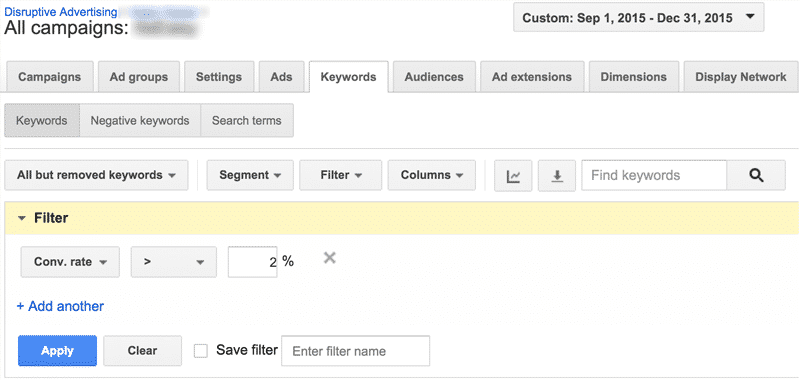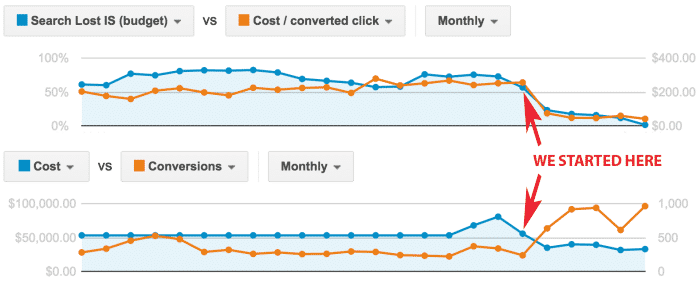by Jacob Baadsgaard • February 4, 2016
How to Spend Less on PPC and Double Online Market Share
Pay-per-click advertising often seems like an exercise in futility.
Despite paying through the nose for online market share, you don’t seem to be getting great results. You know the market is there, you just can’t seem to capture it!
Don’t worry, you’re not alone.
A lot of businesses struggle just to make their PPC campaigns profitable. Even the ones that get a decent return-on-ad-spend find it hard to command the market share they want.
Fortunately, it’s not actually that difficult to get things turned around. In fact, with a few simple changes, I’ve seen many companies double their market share without increasing their PPC budget.
And as a result, they’ve seen dramatic increases in clicks, conversions and sales.

So, what’s the big secret to increasing your online market share? The answer is simpler than you’d expect.
The Market Share Mystery
PPC advertising is all about paying for market share—your ideal audience is searching online for what you have to offer and you pay for the opportunity to market to them.
That being said, most companies don’t use their PPC budgets to command a significant share of their market.
It’s not that they don’t have enough budget for effective advertising—they do—they simply aren’t using their PPC budgets effectively.
If you want to take control of your market, you have to use your budget to own the search terms that really matter to your business.
Are Your Keywords Killing Your Market Share?
Most PPC campaigns suffer from keyword inflation. To avoid missing out on market share, they bid on a variety of keywords that might be used by a potential customer.
The problem is, this approach actually reduces market share.
How? To understand the situation, let’s go back to Marketing 101 and take a look at the definition of “market share.”
market share (n): the percentage of total sales volume in a market captured by a brand, product, or company.
Online market share has nothing to do with the number of search terms that trigger your ads and everything to do with the percentage of searchers in your market who become customers.
In other words, if a keyword isn’t producing conversions and sales, it’s stealing budget from the keywords that are. That means you have less budget to spend on search terms that improve your market share—which means you are losing market share.
Forget the competition, your own search terms are cannibalizing your market share!

Client Case Study
For example, one of our clients came to us after spending over $1.3 million on AdWords. Despite spending more than $50,000 a month on their ads, they were losing 72% of their potential market share to budget limitations.
After looking at their keyword report, it quickly became obvious why—98.9% of their 4,050 keywords were producing < 1 conversion per month!
As a result, 14% of their ad spend was producing 62% of their conversions.
And, with all the other keywords siphoning off their budget, their productive keywords weren’t showing ads 72% of the time.
That’s a problem.
With a 640% higher conversion rate and a 77% lower cost-per-acquisition (CPA), these keywords had the potential to triple (or more) the company’s conversions, but all that market share was being left on the table.
Why? So the company could “increase” their market share by bidding on more keywords?
Doesn’t really make sense, does it?
Improving Online Market Share
To really control your online market share, you need to do 3 things: 1) Identify Your High-Performing Keywords, 2) Eliminate Worthless Ad Spend and 3) Maximize Market Share.
Step 1. Identify Your Top Keywords
Identifying your top keywords is actually fairly easy. In my experience, most PPC managers already know which search terms drive the best traffic.
To really take a hard look at things, though, you need to pull a Keywords report. Open AdWords, set the date range to 3-6 months and click the Keywords tab.

Click the Filter dropdown menu and click “Create filter.” Depending on how you measure success, you can then choose which metric you want to screen for.
In this case, I chose to filter for all keywords with conversion rates > 2%.
From there you can look at a variety of information:
- What percentage of your ad spend do your top keywords account for?
- Which ad sets and campaigns are your best keywords linked to?
- Do your best keywords form the basis for specific campaigns?
- Are any of your high-performing campaigns or ads limited by budget?
- Should any of your keywords be split off from their existing campaign to form a new, more targeted campaign?
Once you’ve got a good feel for how your keywords are performing, it’s usually a good idea to dive into the search terms report and take a look at which actual queries are driving the best results for your business.
Your search terms (also found under the Keywords tab) can provide a ton of additional insight to how your audience is interacting with your keywords.
Even a keyword that you think should be targeting the right intent may actually be getting tons of clicks and impressions for totally irrelevant searches.

By looking at your search terms report, you can uncover exactly which queries produce value and then turn those queries into keywords for new campaigns!
Additionally, you can filter for things like “Conversions = 0” to see which keywords or search terms are performing badly (for more details, check out this blog post, where I used this technique to identify $50,000 a month in wasted ad spend).
Once you’ve identified your best- and worst-performing keywords, it’s time to stop diluting and start improving your market share.
Step 2. Eliminate Worthless Ad Spend
If your PPC campaigns are anything like the 2,000 AdWords accounts we’ve audited, 9% of your keywords are producing 100% of your conversions.
The other worthless 91% of your search terms are probably consuming 76% of your ad spend.
So, if you want to improve your market share, you have to stop wasting money on the wrong keywords.
The process here is as simple as it sounds—eliminate your unproductive keywords.
Turn them off.
Delete them.
Create new campaigns that star your high-performers and pause the old ones.
Whatever it takes, stop paying for your garbage search terms!
Simply by getting rid of your wasted spend, you can expect to see an improvement in overall acquisition cost and conversion rate. All that, while actually spending less on PPC!
Cue the happy dance.

Now technically, you could stop here and simply enjoy getting great results for less money.
However, now that you’ve liberated a major portion of your budget, you can use that extra money to actually increase your market share.
Step 3. Maximize Market Share
Here’s where things get really exciting. By redirecting your previously wasted ad spend towards your effective keywords, you can finally start using your budget to grow your market share.
For example, remember that client I mentioned earlier? Because 86% of their budget was going towards crummy keywords, their effective keywords never had a chance to shine.
Here’s what happened when we took their wasted budget and used it to fund their killer keywords:

Within a matter of days, the company’s ads were showing up for twice as many relevant searches.
That was nice, but market share comes from “sales volume,” not “click volume” or even “conversion volume.”
How did this change affect sales?
Well, by the end of the month, sales had increased by 52%. Within 6 months, sales had nearly tripled!
Cost-per-sale also dropped by 78%, which meant that—by moving useless ad spend to useful keywords—they were spending 25% less for 3x more sales.
Now that’s improving market share!
The results aren’t always this dramatic, but over the years, we’ve used this approach to help dozens of clients double, triple or even quadruple their market share.
In some cases, this might mean you spend your $10,000 budget on only 5 exact match keywords, but if those keywords drive the maximum market share for your business, that’s where you should be spending your money.
Put Your Money Where It Matters
The secret to improving your online marketing share isn’t paying for more keywords, it’s putting your money on the keywords that really matter. Your top keywords should get your top dollar.
So, if you really want to grow your market share, stop fighting with the competition over a long list of keywords!
Find your winners, eliminate the losers and put all that extra budget into getting every last click out of your high-performing search terms.
Account management will be simpler and more profitable, market share will grow and you’ll finally be able to realize the potential of PPC marketing.
By the way, if you’d like me to look at your PPC campaigns and show you where you could be capturing more market share, let me know here or in the comments below. I’d love to help!
You’ve heard my two cents, now it’s your turn. How have you seen poor keyword choices ruin a PPC campaign? Do you have any additional insights into how to improve online market share?





